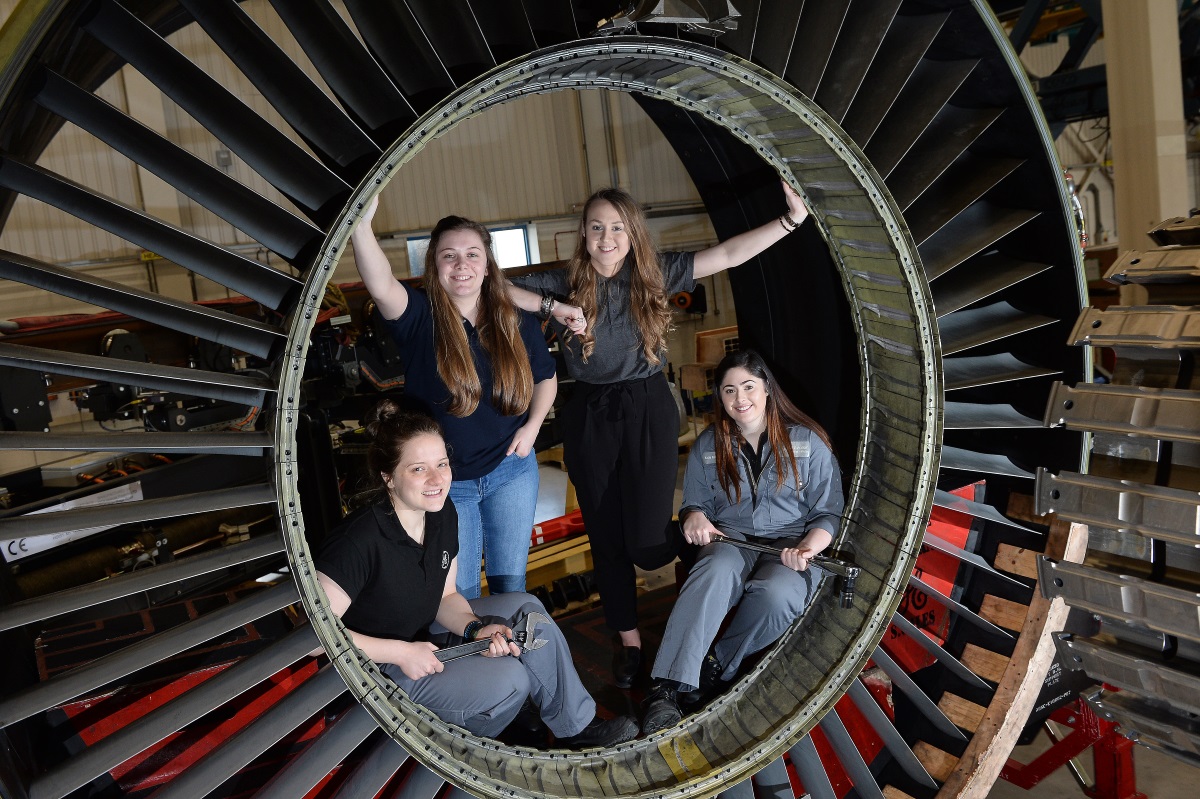WISE up to a career in STEM
Whether you’re imaginative, confident, logical, creative, organised – or shy, even – there are so many well paid and rewarding jobs in the sciences for young women. But girls and young women in the UK aren’t choosing careers in science, technology, engineering or maths. Why not? We ask Dr Mhairi Crawford, Development Director at WISE.
THERE ARE THREE MAIN AREAS OF CONCERN:
1) According to research by Social Market Foundation and EDF, 640,000 STEM jobs will need to be filled by 2023. That’s in less than five years’ time. But there aren’t enough people studying STEM, meaning that employers won’t be able to find the skilled employees they need, and the UK economy will suffer.
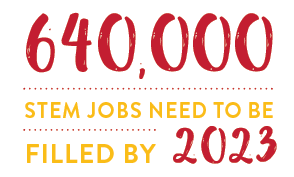
2) Even though girls tend to get better grades in science subjects at school (averaging 66% A-C at GCSE versus 62% A-C for boys), only 35% of girls choose to study maths, physics, computing or a technical vocations qualification after the age of 16. Whereas, 94% of boys go on to study these subjects. This means girls are avoiding subjects they are good at – and will probably be very happy doing – because they feel STEM is not for them.
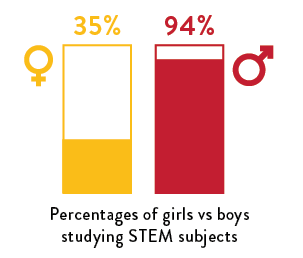
3) In the UK, only 24% of people working in STEM industries – science, manufacturing, energy, computing, for example – are women. This means that women are missing out on jobs that make a difference to people’s lives, are well paid and are incredibly important for the future.
And businesses aren’t getting the skills they need, such as imagination, creativity, people skills and much, much more. Men have these skills, too, but without more women in STEM, there aren’t enough people to fill the skills shortage.
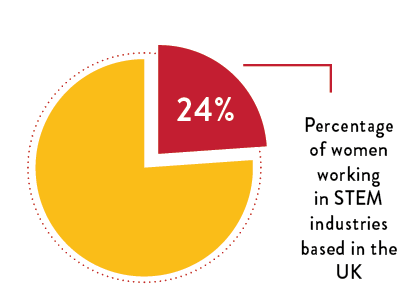
WHAT’S THE SOLUTION? WISE UP TO A CAREER IN STEM
Mhairi talks to us about WISE, and why it’s important for girls and young women to stop seeing STEM as a career choice for men who wear hard hats or sit in their bedrooms writing computer programs.
WHAT IS WISE AND WHAT DOES IT AIM TO DO?
Our goal is to support more women into STEM careers. We work from classroom to boardroom, and we do this by engaging young women to consider jobs in STEM, and by working with employers to help make the workplace a place where women are happy, successful and want to stay. Our immediate target is to have 1 million women working in core STEM careers (not medical STEM professions) by 2020. We’re at over 850,000 at the moment, so we’re on track!
WHY IS AN ORGANISATION LIKE WISE IMPORTANT?
WISE is unique. We work with employers to engage women, which means there’s a real potential for change. As more companies become involved, the more incentives they’ll introduce, i.e. something that encourages women to join their business – and this makes it easier for women to enter and stay in STEM careers.
WHY DO GIRLS AND YOUNG WOMEN AVOID STEM SUBJECTS AND CAREERS?
There are a number of reasons, but I think a lot of it comes down to perceptions. People often think of stereotypes of engineers wearing hard hats and high vis vests, or computer programmers sitting in their bedroom in their underwear. These images don’t help girls identify with roles like these – they probably don’t see themselves like that – and they don’t help parents or carers to identify these roles for their daughters. There’s also the incorrect perception that girls aren’t as good at STEM as boys, or that they shouldn’t be doing hands-on, practical subjects. UK exam statistics show that this is wrong – girls are good at STEM – but it’s taking years to address this.
WHAT’S THE SOLUTION? WISE UP TO A CAREER IN STEM
Mhairi talks to us about WISE, and why it’s important for girls and young women to stop seeing STEM as a career choice for men who wear hard hats or sit in their bedrooms writing computer programs.
WHAT IS WISE AND WHAT DOES IT AIM TO DO?
Our goal is to support more women into STEM careers. We work from classroom to boardroom, and we do this by engaging young women to consider jobs in STEM, and by working with employers to help make the workplace a place where women are happy, successful and want to stay. Our immediate target is to have 1 million women working in core STEM careers (not medical STEM professions) by 2020. We’re at over 850,000 at the moment, so we’re on track!
WHY IS AN ORGANISATION LIKE WISE IMPORTANT?
WISE is unique. We work with employers to engage women, which means there’s a real potential for change. As more companies become involved, the more incentives they’ll introduce, i.e. something that encourages women to join their business – and this makes it easier for women to enter and stay in STEM careers.
WHY DO GIRLS AND YOUNG WOMEN AVOID STEM SUBJECTS AND CAREERS?
There are a number of reasons, but I think a lot of it comes down to perceptions. People often think of stereotypes of engineers wearing hard hats and high vis vests, or computer programmers sitting in their bedroom in their underwear. These images don’t help girls identify with roles like these – they probably don’t see themselves like that – and they don’t help parents or carers to identify these roles for their daughters. There’s also the incorrect perception that girls aren’t as good at STEM as boys, or that they shouldn’t be doing hands-on, practical subjects. UK exam statistics show that this is wrong – girls are good at STEM – but it’s taking years to address this.
WHY SHOULD GIRLS AND YOUNG WOMEN TAKE AN INTEREST IN SCIENCE, TECHNOLOGY, ENGINEERING AND MATHS?
Just think of the difference you could make. It’s not just that there are so many roles out there that are fun, varied and interesting. Or that there are opportunities for travel or doing some really amazing things. You could make a huge difference to people’s lives while doing something you enjoy. Not only that, over the 40-50 years you’ll be working, a career in STEM pays around £250k more than a non-STEM career. Imagine what you could do with that.
PEOPLE LIKE YOU
Mhairi talks to us about the People Like Me project, and how it’s helping girls and young women see that jobs in stem are for people like them – and you.
WHAT IS PEOPLE LIKE ME?
Think how many years you’re going to be working? Probably nearly 50 years. Wouldn’t it be good to find something that will make you happy and successful? People Like Me uses research to help you find out which jobs in science, technology, engineering and maths might suit your personality type. It takes you through a quiz to identify your personality strengths, then matches you to a personality type in the workplace. You might be a manager, a policy maker, an entrepreneur or a supporter; once you understand where you could fit then you can explore careers that suit your strengths, helping you find a pathway to somewhere you could be happy and successful.
WHO’S IT FOR?
Anyone, but it was designed for 11-14-year-old girls to encourage them to choose STEM subjects at GCSE and post GCSE. Our new online People Like Me platform is aimed at the 11-18 age group, and will be available in September – but, really, it works for any age group!
CAN BOYS AND YOUNG MEN USE PEOPLE LIKE ME, TOO?
Yes, but the research behind People Like Me highlighted that women and men (or girls and boys) tend to think slightly differently. Girls tend to use adjectives to self-identify, i.e. using words such as ‘artistic, friendly, intuitive’ to understand the type of person they are. Boys like to use verbs to self-identify, i.e. using words such as ‘good at building, drawing, leading’ to describe themselves. What this means is that while People Like Me works for boys and young men (and it does work), they may not feel comfortable using the adjectives in the quiz.
HOW DO YOU ACCESS IT?
From September, the quiz will be available online. For now, you can print out the quiz and supporting materials from the WISE website. On the website you’ll find:
- The Personality Type quiz
- A glossary to help you with words you might not know
- A Job Analysis sheet to help you find jobs that suit your personality type
- Role models (see examples below)
 IROSHA GUNATUNGA
IROSHA GUNATUNGA
Irosha is a practical person who works methodically to solve tricky construction and engineering problems. She relies on her patience and organisational skills in her job as a site engineer.
 ANNABEL SUNNUCKS
ANNABEL SUNNUCKS
Annabel is very friendly, outgoing and enjoys working with others. She’s an efficient worker and a good problem-solver – all great skills to have in her job as an intern for CA Technologies.
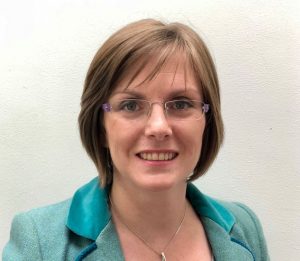 ABOUT MHAIRI CRAWFORD
ABOUT MHAIRI CRAWFORD
“I’m responsible for all the different offerings that WISE has, including People Like Me – which engages girls with careers in STEM (science, technology, engineering and maths) – and Ten Steps – which helps industry to make STEM more attractive to women. I’m also responsible for research and statistics analysis, and I get to think about what we need to do to change things in the future for girls and women.”



